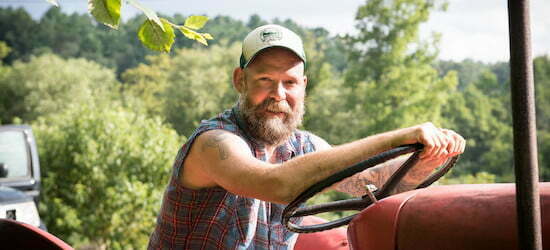ASAP likes to share the stories of people who help us fulfill our mission. This month we talk with KP Whaley of Tiny Bridge Farm, a five-acre diversified farm in Henderson County offering produce through local farmers markets and a CSA.
For anyone who doesn’t know, how are CSAs beneficial to both farmers and buyers?
When CSAs got started the idea was to purchase a share of a farm’s harvest at the beginning of the season, which allows the farmer to buy seeds or equipment in anticipation of the harvest season. The customer purchases a membership stake in the farm, securing food for the coming season, and shares the risk and reward with the farmer. Today there are tens of thousands of CSA farms in the United States, with different products, offerings, pricing structures, and distribution models. In our third year, ours is still evolving, but essentially you pay at the beginning of the season and get a similar value in produce back each week over 20 weeks.
How is the CSA Fair valuable to you and your business? Does it bring more interest to your CSA?
The CSA Fair is very helpful in promoting our farm to the type of customer that appreciates local food and farmers in a much more intimate way than simply buying from us at market. These customers tend to really want to know the farmer and the food, meaning they are a bit more adventurous when it comes to trying new things. They are also a lot more invested in us. They are interested in knowing how, and what we are growing and really want us to be successful as a farm operation. We may get some customers from the fair and that’s great. But we also start building relationships with future customers, and that’s always important.
What does a Tiny Bridge Farm CSA typically include?
We grow lots of greens—lettuce, chard, escarole, kale, collards, arugula. We grow a lot of heirloom and different varieties of tomatoes. You’ll also see common vegetables like beans, potatoes, sweet potatoes, beets, onions, leeks, eggplant, garlic, sweet and hot peppers, summer and winter squash, and herbs.
How have your operations shifted during COVID-19?
Last year’s fair happened just days before businesses started shutting down. I think the reality of what we were facing quickly became real for folks, and as a result, we sold out of shares shortly after. We realized that we may not be able to go to the farmers market (one of our pickup spots), and decided we had to have a way for customers to pick up on the farm. We built a produce cooler that customers can access for on-farm pickup as a direct reaction to the pandemic. Many folks were understandably reluctant to go out in public places during the beginning of the pandemic, and we wanted to be as flexible as possible to accommodate them.
We also had intended to grow our wholesale channel via restaurants, but had to shift this year. We instead sold to the Hendersonville Co-op and some buying clubs. This year we’ll try again with restaurants while continuing those other wholesale avenues.
Are you able to offer ways for CSA members to visit the farm?
We’re still growing the operation and holding down off-farm jobs, so we’re not a place where you just want to stop by. However, I’m always happy to give a short socially distanced tour of the farm when we are there.
Find out more about attending ASAP’s Virtual CSA Fair on March 10.

